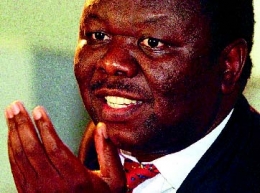Morgan Tsvangirai once said that Robert Mugabe reminded him of his own father – a stubborn old man. In a way, Tsvangirai’s relationship with Mugabe is similar to that of a strict father and a rebellious son. It started with Tsvangirai adoring Mugabe to the point of saying he would die for him, and ended with an open revolt and becoming Mugabe’s most bitter rival.
Tsvangirai, born in 1952, was the eldest of eight children, and he went to work at the age of 16 to support his family. He later became a senior official in the trade unions. In 1980, when Mugabe headed the independent Zimbabwe, Morgan Tsvangirai felt elated. He enthusiastically joined the ranks of Zanu-PF, Mugabe’s party, quickly rising to senior positions. His admiration for Mugabe was such that he said he would lay down his life for his leader.
But Tsvangirai’s support began to flounder when the new president showed a curious zeal for stomping out opposition. Tsvangirai criticised Mugabe’s sanctioning of massacres in his native Matabeleland to crush the rival Zapu party. He steered the trade unions away from Zanu-PF and by 1999 had formed an opposition party, the Movement for Democratic Change (MDC), which started openly challenging Mugabe for the first time since 1988, when Zapu ceased to exist.
Since then, Tsvangirai’s lifestyle has become one of the riskiest in Africa. He has survived four assassination attempts, including one where thugs attempted to throw him out of a tenth-storey window, not to mention numerous beatings, months of forced exile, endless security scares and several arrests after which he was charged with treason. But despite all this, Tsvangirai continues his struggle.
Zimbabwe’s media, which is mostly controlled by the government, denounces him as a traitor to the war of liberation (Tsvangirai never took part in the war against the whites) and a puppet of the west. But many ordinary Zimbabweans express admiration for the man’s courage and determination.
Observers note that Tsvangirai is at best an inexperienced (and at worst an incompetent) politician, who does not have a coherent program for dealing with Zimbabwe’s difficulties. Moreover, his markedly non-violent movement is not likely to bring about much change in the face of Mugabe and his generals. But Zimbabweans increasingly embrace Tsvan-girai’s party, and had last year’s elections been free and fair, the MDC would have likely won.












